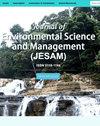菲律宾的水、环境卫生和个人卫生习惯:在地方一级实现国家和全球目标
IF 0.3
4区 环境科学与生态学
Q4 ENVIRONMENTAL SCIENCES
引用次数: 1
摘要
随着国家和全球水、环境卫生和个人卫生目标的制定和项目的实施,本研究旨在评估菲律宾达沃地区选定地区在地方一级实现这些目标的情况。使用一种结合了国家指南和全球建议的改进工具,对随机选择的家庭的水、环境卫生和个人卫生指标进行了评估。在大多数村庄,获得经验证的改善饮用水源的情况低于目标,而所有村庄的经验证的卫生厕所覆盖率均未达到目标。在一些村庄,经证实的获得改善的水和卫生服务的情况与报告的情况存在显著差异。大约87.5%的家庭拥有洗手设施,但其中只有51.2%的家庭同时拥有水和肥皂。由于菲律宾的卫生系统分散,监测方面存在差距,这对实现这些目标构成挑战。有必要使指标标准化并优化工具,以便对水、环境卫生和个人卫生习惯进行全面评估。这将有助于生成符合国家指导方针和全球建议的地方数据,以加强政策并确定改善水、环境卫生和个人卫生服务提供的优先领域。本文章由计算机程序翻译,如有差异,请以英文原文为准。
Water, Sanitation and Hygiene Practices in the Philippines: Meeting National and Global Targets at the Local Level
As national and global water, sanitation, and hygiene targets have been set and programs have been implemented, the study aimed to assess the attainment of these targets at the local level in selected areas in Davao region, the Philippines. Randomly selected households were assessed for water, sanitation, and hygiene indicators using a modified tool that combined national guidelines and global recommendations. Validated access to improved water source for drinking was below the targets in most barangays, while validated sanitary toilet coverages in all barangays did not meet the targets. Significant difference was observed between validated and reported access to improved water and sanitation services in some barangays. Approximately 87.5% of households had a handwashing facility, but only 51.2% of which had both water and soap available. Achieving the targets is challenged by the gap in monitoring due to a decentralized health system in the Philippines. There is a need to standardize indicators and optimize the tool to allow a comprehensive assessment of water, sanitation, and hygiene practices. This will help generate local data that are in line with national guidelines and global recommendations to enhance policy and to determine priority areas for improved water, sanitation, and hygiene service delivery.
求助全文
通过发布文献求助,成功后即可免费获取论文全文。
去求助
来源期刊

Journal of Environmental Science and Management
ENVIRONMENTAL SCIENCES-
CiteScore
0.90
自引率
0.00%
发文量
10
审稿时长
2 months
期刊介绍:
The Journal of Environmental Science and Management (JESAM) is an international scientific journal produced semi-annually by the University of the Philippines Los Baños (UPLB).
JESAM gives particular premium to manuscript submissions that employ integrated methods resulting to analyses that provide new insights in environmental science, particularly in the areas of:
environmental planning and management;
protected areas development, planning, and management;
community-based resources management;
environmental chemistry and toxicology;
environmental restoration;
social theory and environment; and
environmental security and management.
 求助内容:
求助内容: 应助结果提醒方式:
应助结果提醒方式:


